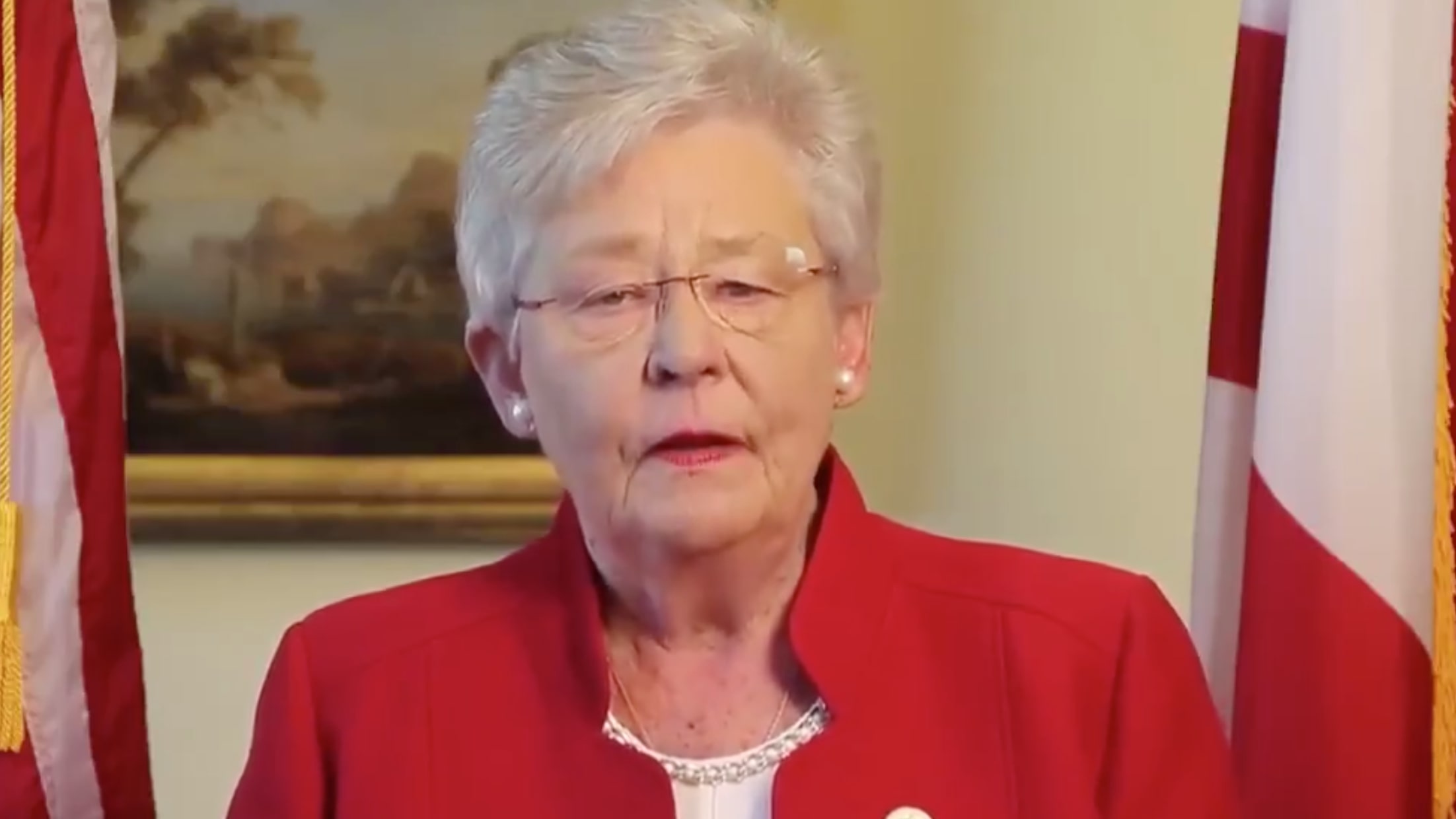Alabama Governor Kay Ivey is facing calls for her resignation after trying to get ahead of an emerging scandal over her use of blackface while in college.
Her staff sent out an urgent statement on Thursday apologizing for what she said during a 1967 interview that emerged as part of an Auburn University project digitizing old media.
The governor had been on the defense since February when an Alabama newspaper discovered dozens of blackface photos and racist content in a yearbook featuring Ivey's sorority, Alpha Gamma Delta.
Although she was not pictured in the yearbook, Ivey was listed as vice president of the student body on a page filled with numerous women in blackface. She initially denied any involvement in the photos.
On Thursday, she contacted local Alabama politicians with an apology and attached audio of an Auburn campus newspaper interview in 1967 with Ivey and her late ex-husband, Ben LaRavia.
In the audio clip, you can hear the pair gleefully tell a story about Ivey's blackface performance at an Auburn Baptist Student Union event in the 1960s.
"She had on blue coveralls, she had put some black paint all over her face, and she was — we were — acting out this skit called Cigar Butts," LaRavia said in the interview. "I could not go into a lengthy explanation, but to say the least, I think this skit, it did not require a lot of talent, as far as verbal talent. But it did require a lot of physical acting, such as crawling around on the floor looking for cigar butts and things like this."
The 74-year-old governor defended herself in a statement on Thursday claiming she "did not remember it" and that it happened more than 50 years ago.
BREAKING: Governor Kay Ivey issues an apology for a racist skit during her time at Auburn. There have been photos released of Ivey's sorority sisters posing in "blackface".
Click to hear audio from a radio interview of the Governor following the skit. https://t.co/MDeyHFDZR4
pic.twitter.com/ViBNjaZSKV— Alabama News Network (@ALNewsNetwork) August 29, 2019
“Even after listening to the tape, I sincerely do not recall either the skit, which evidently occurred at a Baptist Student Union party or the interview itself, both which occurred 52 years ago. Even though Ben is the one on tape remembering the skit — and I still don’t recall ever dressing up in overalls or in blackface — I will not deny what is the obvious,” Ivey said.
“As such, I fully acknowledge — with genuine remorse — my participation in a skit like that back when I was a senior in college. While some may attempt to excuse this as acceptable behavior for a college student during the mid-1960s, that is not who I am today, and it is not what my administration represents all these years later," she added.
Ivey called Senate Minority Leader Bobby Singleton, D-Greensboro, who is Black, to apologize. He told The Montgomery Advertiser that the audio clip emerged as Auburn University was going through old files.
"Libraries staff are systematically digitizing archives data and posting them online, making them fully accessible to the public," Auburn University said in a statement on Thursday. "The reel-to-reel containing the interview with the governor is part of that process."
Singleton was much more conciliatory and accepted Ivey's apology. Other Black politicians and activists across Alabama called for Ivey to resign and said it was unacceptable for the governor to have participated in activities like this at all.
"I offer my heartfelt apologies for the pain and embarrassment this causes, and I will do all I can — going forward — to help show the nation that the Alabama of today is a far cry from the Alabama of the 1960s. We have come a long way, for sure, but we still have a long way to go,” the governor said.
Despite her apology, Ivey's press secretary, Gina Maiola, told The Washington Post that Ivey would not be stepping down because her “commitment to serve the state is unchanged and unwavering.”
Racism – in any of its forms – is never acceptable, not in the 1960s and not now. Governor Ivey’s actions were reprehensible and are deeply offensive. Her words of apology ring hollow if not met with real action to bridge the racial divide. https://t.co/6uxqEyQq6X
— Rep. Terri A. Sewell (@RepTerriSewell) August 29, 2019
For many in Alabama, her apology has fallen on deaf ears due to her rabid support of Confederate monuments. Since taking office in 2017, she has made it a point to protect Confederate monuments across the state and even signed a law banning people from changing or moving any memorials.
Ivey took office after former Governor Robert Bentley was nearly impeached for a wide-ranging sex scandal involving his chief of staff. She easily won reelection last year in a landslide.
Despite the condemnations from many of the state's Black representatives, Alabama is controlled almost entirely by Republicans, who have shown little interest in the scandal. The state's Republican party released a statement lauding Ivey for taking control of the scandal and addressing it head-on.
“There’s some things you just can’t do,” Benard Simelton, president of the Alabama NAACP, told The New York Times on Thursday.
“If you participated in blackface and things like that then you should not be governor of any state,” he said.

